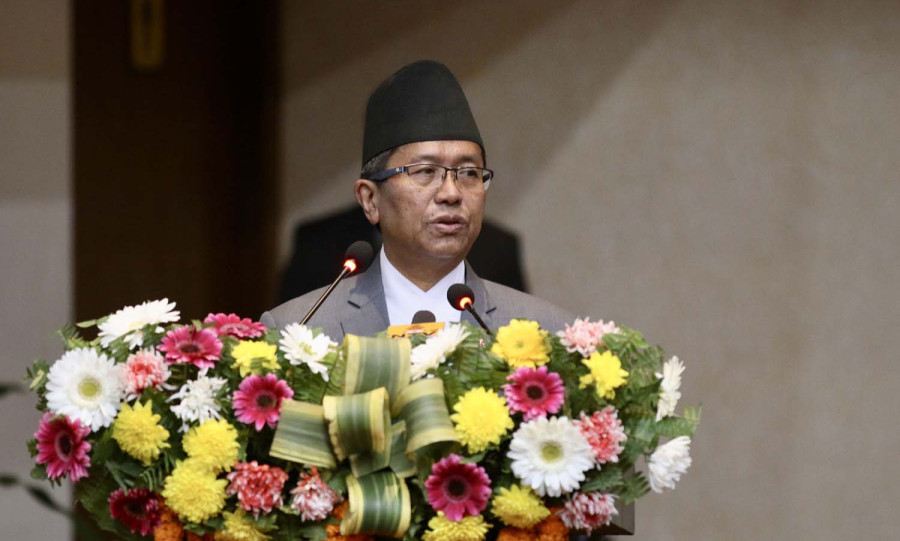National
CIAA calls for an end to corruption under the guise of Cabinet’s policy decisions
Prime Minister Dahal promises to make efforts to amend existing anti-corruption laws in line with UN Convention.
Prithvi Man Shrestha
The Commission for Investigation of Abuse of Authority has asked the government to give up the tendency of taking decisions through the Cabinet on the issues that are normally supposed to be decided by lower levels of the government as per the law.
As the Commission for Investigation of Abuse of Authority Act-1991 bars the anti-graft body from investigating the policy decisions taken by the Cabinet, there is a growing tendency among policymakers of forwarding the matters to the Cabinet for a decision even for the tasks to be performed from the minister or secretary level to avoid investigation by the CIAA.
Section 4 (B) of the CIAA Act states, “The Commission, pursuant to the Act-1991, shall not take any action in matters relating to any business or decisions taken at meetings of any House of Parliament or of any committee or anything said or done by any member at such meetings, or any policy decisions taken by the Council of Ministers or any committee thereof or judicial actions of a court of law.”
Chief Commissioner of CIAA Prem Kumar Rai said on Saturday that the commission has repeatedly drawn the attention of the government to discourage such tendency.
“The commission is confident that the [political] leadership would adopt an appropriate policy, method, and system based on conscience and long-term vision regarding such matters,” he said while speaking at an event the commission organised to celebrate its 32nd anniversary on Saturday.
However, the commission’s demand has not been addressed in the amendment bill registered at the National Assembly. Besides the policy decisions of the federal government, the bill has sought to keep even the provincial cabinet’s policy decision away from the purview of the anti-graft body.
Two amendment bills against corruption—CIAA Act-1991 and Prevention of Corruption Act-2002—have remained stuck in the upper house for the last three years.
The bills were introduced to make the anti-corruption laws compatible with United Nations Convention against Corruption of which Nepal is a signatory member.
However, Prime Minister Dahal said during the function that the government would make efforts to amend the anti-corruption laws in line with the UN Convention against Corruption and get them endorsed by the parliament within this year.
“As a party to the UN Convention against Corruption, the government is committed to fulfilling its national commitments while expressing solidarity to international efforts against corruption,” Dahal said.
The convention has called for criminalising corruption in the private sector too, but Nepal’s constitution and law allow the anti-graft body to look after corruption of public officials only. Likewise, the new constitution deprives the CIAA of investigating the ‘improper conduct’ of public officials.
Chief Commissioner Rai called for expanded jurisdiction for the CIAA to enable it to investigate even improper conduct, issues related to conflict of interest, and private and non-government sectors as well.
However, political parties are little concerned about conflict of interest which may promote corruption. Former Deputy Prime Minister and Home Minister Rabi Lamichhane and Urban Development Minister Bikram Pandey faced criticism for holding posts that would result in a direct conflict of interest.
On January 27, the Constitutional Bench of the Supreme Court stripped Lamichhane of membership of the House of Representatives, concluding that he hadn’t applied to reacquire Nepali citizenship even though he had already renounced his American citizenship. Before that, he was holding the post although he was being investigated by the agencies under the home ministry for possessing dual passports, of Nepal and the United States, at the same time.
Pandey on the other hand is holding the post of the ministry which might have to choose contractors including his own company Kalika Construction and others.
Prime Minister Dahal also said that the government is committed to initiating legal action against those involved in corruption at any period of time. But such commitment has not been translated in the amendment bill to the Corruption Prevention Act registered at the National Assembly.
The bill has fixed a five-year time limit to register a case in the court from the date when the alleged corruption is identified.
Though the bill was registered by the KP Sharma Oli government, Dahal was co-chair of the erstwhile Nepal Communist Party (NCP) along with Oli.
Later, in March 2021, the Supreme Court invalidated the NCP separating the CPN (UML) and CPN (Maoist Centre).
During the event, President Bidya Devi Bhandari stressed the need for collective efforts from the political, administrative, and CIAA leadership to control corruption.
“Ensuring rule of law, human rights and good governance is the main responsibility of the state,” she said. “So political commitment is a must to control corruption.”
She also called the CIAA to keep itself away from the political development in the country. “Political change is natural in a democracy,” she said. “The commission should be ready to fulfil its duty as determined by the constitution and laws.”




 13.12°C Kathmandu
13.12°C Kathmandu














